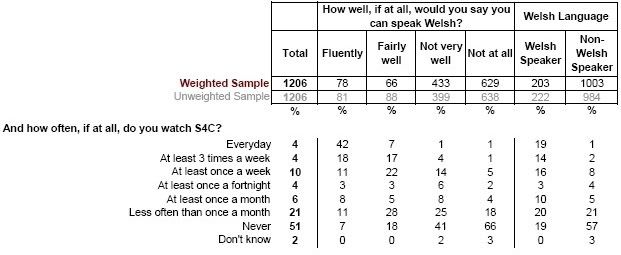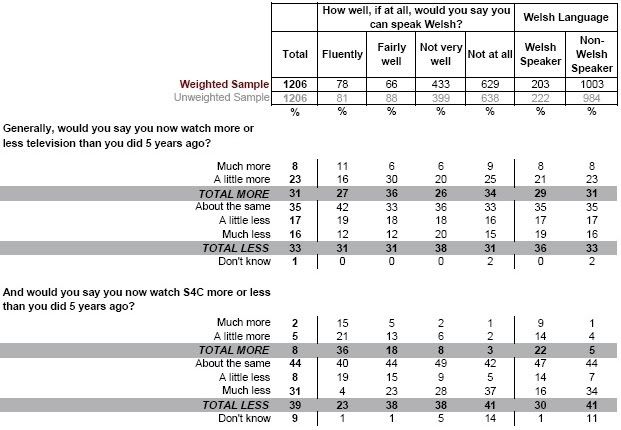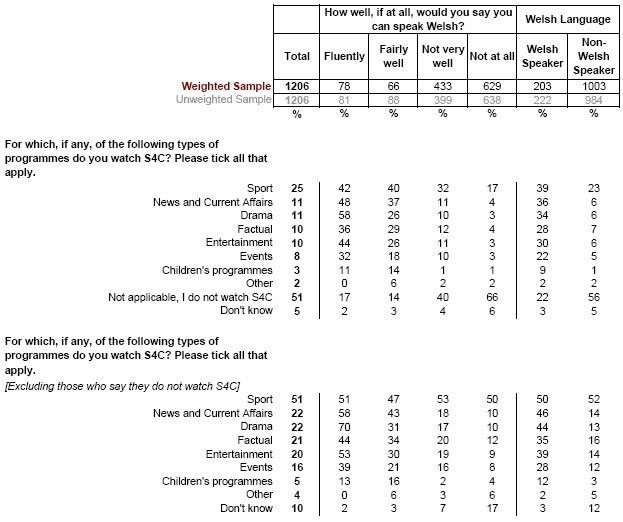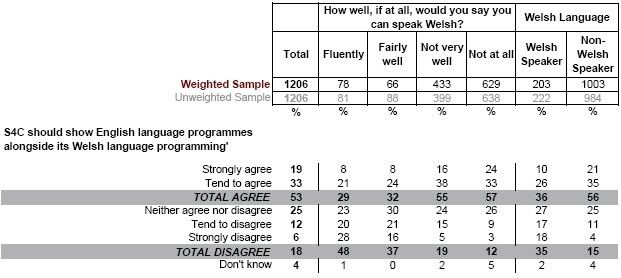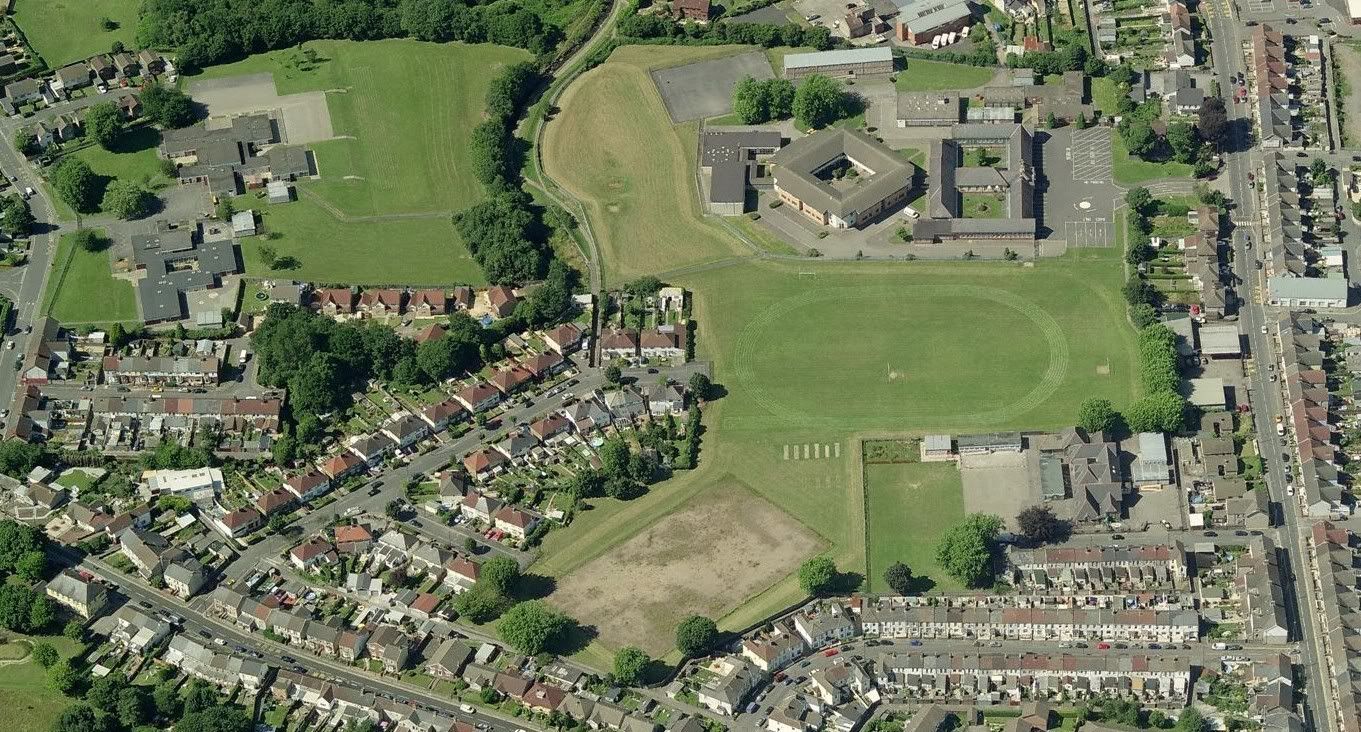In my post yesterday, I focused on the proposed new funding model for S4C, saying that I thought the principle of S4C receiving the bulk of its funding from the television licence fee was acceptable, subject to details about the actual sums of money involved and the need to establish this funding base in the long term. However I think it's worth repeating that I am talking about S4C receiving this money from the TV licence fee directly as a designated, ring-fenced sum. The principle of "top slicing" the licence fee has now been established for some years, and the way I read the DCMS/BBC agreement, it seems clear that this will continue.
He who pays the piper does call the tune. That is why it is important that we establish beyond any doubt that the sums designated to S4C from the licence fee are not the BBC's money, and that the BBC should have no control over how this money is spent. The way to ensure this is to write it into the new legislation rather than rely on the discretion of the parties concerned, and to set out a mechanism for determining what share of the licence fee should be given to S4C in the future.
One of the main reasons I think it's important to deal with funding separately is simple and pragmatic. In any negotiation "principles" and "money" are two terms which are notoriously difficult to separate. So if we can nail down the aspect of funding, it then makes it much easier to talk about the management and commissioning structure through which we get Welsh language television. It also makes sense from the perspective of what is happening politically, for it would be naïve for anyone to think that what has happened in the past few months, or indeed the last few days, has not been almost exclusively motivated by the desire to cut public spending. It is this that the government in Westminster has been primarily concerned about, not the quality or nature of Welsh language television.
The problems with the DCMS/BBC agreement
Management and commissioning are matters that certainly do need to be addressed, but the most important thing to note on this subject is that the agreement reached last week is between the DCMS and the BBC, with S4C having no place in the discussions. So even though I don't think it should particularly matter to S4C whether the bulk of its budget comes from government subvention or the television licence fee, I do think that any change to the management and commissioning structure of S4C cannot be decided without reference to them.
For that reason I fully support S4C's decision to seek a judicial review.
But we must be under no illusions about what we expect a judicial review to achieve. In all probability the most that will happen is that the DCMS will be told that it acted precipitously and that it should now undertake a proper consultation. But there will be nothing to stop the DCMS doing that, but then coming to exactly the same decision that it has already taken. The judiciary deals with whether something is lawful or unlawful, and whether the proper procedures have been followed in reaching decisions. We cannot expect any judge to make political decisions.
As I have said a number of times, the Westminster government can do whatever it likes providing it can get a majority to pass the necessary legislation through parliament. It can abolish S4C completely if it can get a bill to that effect through parliament. Therefore the primary focus of our opposition to the Westminster government's proposal must be political. We must persuade MPs that the independence of S4C is of such importance to us that it would be politically unwise of them to push these plans through. That involves protest and demonstrations.
So what arguments should we use? Let's start by looking at the relevant clauses of the DCMS/BBC agreement:
• Having decided to reduce its own funding for S4C as part of the CSR, HMG holds that a new partnership model with the BBC is the best way of securing the long-term future of the service.
• There would be a BBC and S4C partnership along similar principles to BBC Alba to begin by 2013/14, with S4C coming under a BBC Trust Service Licence or other operating agreement which would be jointly agreed with the S4C Authority and which would set out the strategic goals and broad editorial requirements of the service.
• A combined Board of the Authority and Trust would oversee delivery of the Service Licence or operating agreement.
• The S4C service will be operated by a joint management board with a majority of independent directors, appointed by the BBC Trust and the Authority. The management board will operate its own commissioning structure.
• Further discussion will be required about the exact form of the partnership, and the Government will play its part in those discussions.
• The total content commissioning budget will be for independent producers (outside of the BBC's ongoing statutory commitments)
As I read it, this seems to indicate that the DCMS are going to retain the S4C Authority as the body which would receive funds, and that these would come from the television licence fee, a continued but reduced government subvention, and commercial activities. This is reassuring. The changes that are proposed seem not
to affect the S4C Authority, but the management of the channel.
-
Now, although we do not know the precise reasons why Iona Jones left as chief executive of the channel, we do know that the S4C Authority made an announcement the very next day saying that it intended to get rid of the "arm's length" separation between the Authority and the channel's management team. This is what it said:
The S4C Authority has announced a change in S4C’s management structure that will lead to a closer working relationship between the Authority and the management team.
S4C Authority Chairman John Walter Jones said that the S4C Authority, the regulatory body that oversees S4C’s performance, would work closer with a leaner management team.
[He] said: “In order to ensure that the Channel’s future remains secure and that the organisation is run efficiently, the most fundamental change is that the concept of due separation between the S4C Authority and the management team will now cease. S4C is a unitary body and this unitary organisation should manage and safeguard the interests of S4C viewers and the Channel’s suppliers in the future.
S4C Authority Press Release, 29 July 2010
It is hard to escape the conclusion that Iona Jones left because she was not prepared to see the erosion of this due separation. It is also hard to escape the conclusion that the DCMS was none too pleased with this ... although that view might be heavily influenced by the BBC who, unlike the DCMS, would have a more informed understanding of the way the industry works. This was an unsavoury episode, made worse by S4C's complete disregard for transparency and the need for a public body to give some sort of public explanation of what was going on behind closed doors.
I don't want to take sides in that dispute, not least because I don't know enough to know what side to take. But it is clear that the Authority felt the need to step in and do the job it had previously entrusted to an arm's length management team. Therefore, if management and commissioning is seen to be a problem, it should come as no big surprise that the DCMS/BBC agreement should address that issue and propose what they think is a better arrangement. Nor should it be surprising that their preferred solution should be one that gives the BBC more control. The BBC are hardly disinterested observers ... they want what suits them. Who wouldn't?
The BBC's track record
But we need to be under no illusions that the BBC can be particularly ruthless in pursuit of its own ends, especially when its own back is against the wall. The unilateral announcement that it would cut spending on the Welsh language programmes it provides to S4C from £23.5m to £19.5m is an example of this. It is all the more remarkable because it was made on 8 October ... nearly a fortnight before any decision on the BBC's own funding been reached. It would perhaps be understandable to make such an announcement in response to a decision on BBC funding, but to make such a decision at a time when the BBC's income from the TV licence fee had merely been frozen, not cut, is surely proof enough that Welsh language programming is quite low on the BBC's list of internal priorities.
But if anyone is still not convinced of that, another way of illustrating the same point is to look at what has happened to the BBC's Welsh language output over the last 25 years. As I said last month in this post, when S4C was first set up in 1982 there were only three other free-to-air channels available (BBC1, BBC2 and ITV) plus non-peak Channel 4 programming. In 1982, the BBC broadcast could not have broadcast more than about 36 hours; but now, on one typical day, the BBC broadcasts 139 hours of programming to Wales, i.e. about four times as much as it broadcast in 1982. Although when repeats are taken into account, it might be a little less.
But what has the BBC done to increase its Welsh language output to match its increase in English language output? Well, hardly anything. It has voluntarily increased the programming it provides from 10 to 12 hours a week ... a 20% increase in contrast to its 400% increase in English language programmes. So it is very clear that the BBC doesn't regard itself as being under any sense of moral obligation to treat Welsh and English in the same way.
The lesson to be learned from this is that we cannot entrust the future of Welsh language broadcasting to the BBC. I am sure that there are many individuals within the BBC (and particularly in BBC Wales/Cymru) who do care passionately about it, but this does not extend to the corporation as a whole ... or at least the ranks of its most senior decision makers. Though equally it must be said that the BBC still has major problems coming to terms with adequately reflecting the current political landscape in the UK after more than ten years of devolution.
Conclusion
So in conclusion, although there are undoubtedly changes that need to be made to the way that S4C manages the channel and commissions the programmes shown on it, a forced marriage between S4C and the BBC resulting in a joint management and commissioning team is not the right way to go about it.
The principle at stake is plurality. If the editorial choices for all Welsh language broadcasting are made by one "joint management board" operating under one "service licence or operating agreement" then we will only be presented with one view of the world. It won't matter if the joint management board is made up of representatives from S4C, the BBC and a good number of independents. Nor is it a matter of one view being intrinsically better or worse than another ... even the best, most informed view is still only one view.
The BBC makes its own programmes in Welsh. The executive decisions and editorial standpoint of those programmes are for the BBC to decide, subject to its own internal guidelines and procedures. Some will be programmes produced in-house, others will be commissioned from independent producers. This is a good thing. S4C is slightly different in that it commissions all its programmes from independent producers. This is good too. Taken together, we have a model that delivers plurality. So why get rid of it in favour of a new model that by definition cannot and will not be able to deliver plurality?
-
The basic point of principle we must fight for is that the executive decision making and commissioning of programmes in both S4C and the BBC are kept independent of each other, as is currently the case. Of course this does not mean that they can't work together, for the two organizations already have a strategic partnership agreement. Also, there is nothing to stop the two organizations working together in other ways if it is of mutual benefit to them both. If sharing back office functions saves money then of course they should look at ways of doing it. But this is completely different from being forced to work together because it is dictated by badly thought through legislation.


